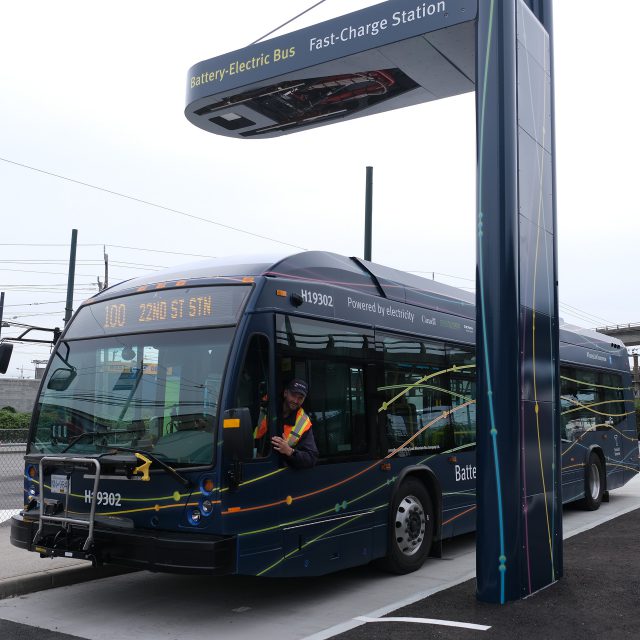A green light for battery-electric buses in Metro Vancouver
A green light for battery-electric buses in Metro Vancouver

The mood around TransLink headquarters is electric this week.
That’s because earlier today, our region’s mayors endorsed a new plan to convert 50 per cent of our bus fleet to clean, zero-emission, battery-electric buses over the next decade.
This update to our Low Carbon Fleet Strategy will supercharge our efforts to lower greenhouse gas (GHG) emissions by removing more than 600 diesel and diesel-hybrid buses from our roads by 2030.
It will also empower us to install charging infrastructure along bus routes throughout our region and build B.C.’s first fully electric capable bus depot.
Most importantly, it will put TransLink on course to meet our goal of providing 100 per cent renewable energy-powered public transit by 2050.
With each passing day, public support for climate action grows. Residents across Metro Vancouver are doing their part to reduce their carbon footprints — and they are increasingly expecting companies and public bodies to follow suit.
We are proud of the role that TransLink plays in lowering emissions by easing traffic congestion, reducing single-occupancy vehicle use, and supporting active forms of travel, such as walking and cycling.
Transportation accounts for over 35 per cent of all GHG emissions in our region, which puts TransLink in a position to lead the charge on climate action. With one of Metro Vancouver’s largest fleet of heavy-duty vehicles, we must investigate the adoption of new technologies, including electrification and clean fuel sources, such as renewable natural gas.
Last fall, we launched a historic pilot project with four battery-electric buses — each of which will decrease GHG emissions by 100 tonnes and save $40,000 in fuel costs per year compared to a conventional diesel bus.
Now, imagine those results amplified across our entire fleet.
I believe that we are standing on the cusp of a revolutionary era for transportation, which is exciting for all of us at TransLink. But the transition won’t be easy, and we can’t accomplish it on our own.
To unlock our full potential, we will need bold leadership and support from all levels of government. In addition to the Mayors’ Council’s endorsement, our strategy will require $447 million in new funding over the next 10 years, including significant support from senior levels of government.
Why does the transition to renewable energy cost so much? Because the new battery-electric buses are more expensive than traditional buses and will also require a whole new charging infrastructure. And while it’s a large investment upfront, over time this technology will have a positive lifecycle cost due to the money we will save on fuel.

We believe the time to act is now, given that we stand at a pivotal moment in our organization’s history. In the next few years, we need to retire many of our older buses and procure new ones. If we do not get started with the transition to electric buses now, we will buy a new generation of diesel/hybrid buses that will last 17 years or so. We have a unique opportunity to move to zero now, which is why we have laid out such an ambitious plan.
It’s important to note that this evolution to electric comes at a time when we will also be expanding our system. Over the past four years, we have seen ridership increase by more than 20 per cent, putting intense pressure on TransLink to keep up with demand. To best serve our customers and our region, we need to continue adding new service while also electrifying our fleet. It’s not an either-or situation. We need to do both.
Fortunately, governments at the local, provincial, and federal level have all demonstrated a commitment to transit expansion and taking climate action. What’s more, they understand that investing in cleaner technologies is one of the surest ways to meet our sustainability targets and meaningfully reduce emissions.
The road to a greener future will be paved through innovation.
Today, the Mayors’ Council took the first step down that road by giving our Low Carbon Fleet Strategy the green light.
Now, it’s time for us to move forward.
Learn more about our Corporate Sustainability Initiatives at translink.ca/sustainability.
Kevin Desmond, Former TransLink CEO
Kevin Desmond is the former Chief Executive Officer of TransLink, Metro Vancouver’s transportation authority that moves 500,000 people every day. He oversaw planning, financing, and management of a region-wide multimodal transit network that includes bus, rapid transit, passenger ferry, para-transit, and commuter train service, with over 8,000 employees.





